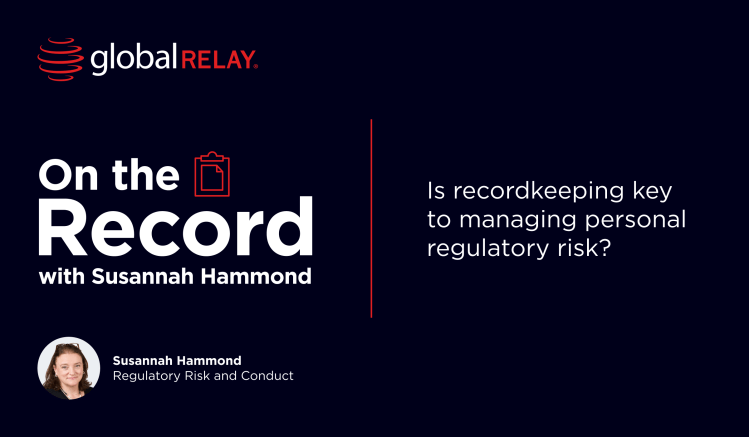On February 7, 2024, we were joined by Jamie Bell, Head of Secondary Market Oversight at the Financial Conduct Authority (FCA), for a fireside chat as part of our Conduct, Culture, and Compliance event. Held at our London offices, the session saw Rob Mason, our Director of Regulatory Intelligence, discuss regulatory trends and challenges for the year to come.
We’ve summarized the key insights from the session, which covered a diverse range of topics from artificial intelligence and crypto to communications capture and the need for compliance-first culture.
“Joining the dots between compliance problems” – Non-financial misconduct
The FCA has recently issued letters to regulated insurers and insurance intermediaries requesting that those firms provide information of non-financial misconduct incidents, how they have been detected, and outcomes from those incidents. Although these letters have been issued to the insurance sector – highlighted by the FCA as having “a long way to go in having an inclusive culture…” – Jamie Bell counseled that we should not “read to much into” insurers being singled out.
These firms are in fact “first on the list” to receive these surveys, but not the only ones. Bell revealed that 1,000 firms will receive them, including insurers, insurance brokers, wholesale brokers, and banks. On the topic of non-financial misconduct, Bell believes there are strong correlations between compliance failures such as market abuse and non-financial misconduct. He used the example of voice surveillance practices used to identify market abuse also identifying non-financial misconduct, and that voice surveillance more easily detects non-financial misconduct than other forms of non-compliance. He sees it as inevitable that voice surveillance will be more widely deployed in this context as that infrastructure is already widely available.
Bell also identified that there are several “canary in the mine” red flags that might indicate a firm has potential issues with non-financial misconduct, such as poor transaction reporting. Bad transaction reporting indicates a firm may have bad controls in place across the board, and will likely draw more investigative scrutiny from the FCA, as Bell believes the regulator is “sensitive to joining the dots between compliance problems”.
The “perennial question” – The FCA and WhatsApp
Given the Securities and Exchange Commission’s (SEC) ongoing high-profile crackdown on off-channel communications and WhatsApp use, it is no surprise Bell considers ‘will the FCA follow suit’ a “perennial question”. He highlighted that the FCA’s view is that communications surveillance should be targeted toward particular risk areas within businesses, a different line to the SEC’s strict liability approach. Firms in the US are required to record all business communications, and while Bell understands this provides more certainty on what channels businesses need to surveil, he also believes firms need to “be careful what they wish for” should that regulatory expectation make it across the pond.
That said, Bell said that the FCA “will be unsympathetic” to firms that have not considered their communications risks, put the right surveillance protocols in place, or not acted against individuals found to be in breach of these policies. The expectation is that firms follow through on their own policies, and that “proper compliance culture” is in place across businesses.
FCA working to be “an enabler, not a blocker” for AI growth
AI
Inevitably, the hot-button issue of artificial intelligence (AI) featured in the discussion. Bell believes the technology will be – and already is – a “game changer”. He explained that by the end of April 2024, the FCA will be “ingesting over a billion trading records every day”, and will need technology to deal with this huge influx. The regulator is designing infrastructure with AI and machine learning in mind to manage this data and exploring opportunities to share it with other regulators, as well as developing potential market surveillance using AI and machine learning.
Bell sees the applications of AI in streamlining and increasing the effectiveness of other solutions. Where voice capture and surveillance rely on inflexible lexicons and rules, there is potential for AI to compensate for this. He does, however, see a need for the industry to “get over explainability problems” regarding AI. He discussed that the FCA is interested in perhaps having a lessened burden of explainability, or establishing new forms of it, in order to allow people who are not data scientists to be able to give assurances that AI models are working as expected. The FCA is determined to facilitate this transition, and to be seen as “an enabler, not a blocker” to AI growth.
However, Bell believes that “the best AI tools only get you so far”, and human expertise is required at “the other end” of the process to get the most out of it. He sees the industry as “on the cusp of a new and exciting technology that will make our jobs more rewarding and easier to do”. Bell referenced the outlook of Andrew Bailey, Governor of the Bank of England: that we should not “fear” Ai, and that we aren’t “all about to be replaced” by these technologies.
Social media
“The FCA has been interested in social media for a very long time”, according to Bell. He summarized the potential risks social media platforms can pose to market integrity by referencing the real-world impact a fake image of an explosion near the Pentagon had on stock prices in May, 2023 when it was shared on X. He sees the complex interaction and “feedback loops” between AI, social media, and trading algorithms as a risk area, with the potential for these tools to manipulate the market and disrupt market integrity. The potential off-channel communications risk posed by LinkedIn was also highlighted, with Bell admitting that you “can’t clearly control what another broker or organization chooses to share with you on LinkedIn, but you can control your own staff”, echoing his earlier comments on the importance of firms having clear policies in place and the importance of “proper compliance culture” while firms navigate these emerging technology risk areas.
Cooperation at the heart of compliance
Regulators have been highlighting the importance of firms proactively cooperating with them for some time, and the importance of that spirit of openness was something Bell highlighted. Although he reminded us that FCA Principle 11 requires firms to be “open and honest” with the regulator, and that it is “not an option, that’s the requirement”, the FCA can only do its job “if you’re open and honest with us”.
Bell confirmed that the regulator encourages an open dialog with the industry, and is “in the market to make it easier and safer for people to do their jobs”. While the expectation from the FCA is that professionals exercise their judgment when it comes to acting compliantly and reducing risk, Bell reassured that the FCA “understand that you don’t get every judgment right every time”.




